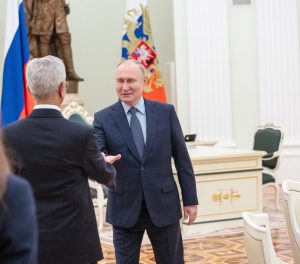Rajeswari Pillai Rajagopalan

Indian Foreign Minister Dr. S. Jaishankar was in Russia on a five-day visit in late December. Upon conclusion of the visit, the Indian Ministry of External Affairs (MEA) issued a press release saying that he had meetings with a number of senior Russian officials including President Vladimir Putin, which is considered unusual for the Kremlin in normal circumstances. Following his meeting with Putin, Jaishankar said in a tweet that he “(A)pprised President Putin of my discussions with Ministers Manturov and Lavrov. Appreciated his guidance on the further developments of our ties.” As he noted, Jaishankar also met with Deputy Prime Minister and Minister of Industry and Trade Denis Manturov and his counterpart, Russian Foreign Minister Sergey Lavrov.
According to the MEA press release, the minister had extensive discussions on various aspects of bilateral relations, including economic, trade and energy as well as defense cooperation. Jaishankar also traveled to St. Petersburg, where he met with the governor and explored possibilities for economic and cultural cooperation.
During the visit, Jaishankar signed three documents pertaining to the Kudankulam nuclear power plant, an MoU on cooperation in healthcare and pharmaceuticals, and a protocol on Foreign Office consultations. The press release noted that the minister’s visit was an occasion to take stock of bilateral relations, which, it noted, “have remained strong and steady building upon strategic convergences, geopolitical interests, and mutually beneficial cooperation between the two countries.”
Indeed, this fits within the Indian foreign policy goal of ensuring good relations with all major powers, which includes Russia, despite its invasion of Ukraine, violating the sovereignty and territorial integrity of a fellow United Nations member country. That India did not condemn the Russian invasion, nor call out Russia for it, is a win for Moscow. In what can be considered a thinly veiled criticism, Indian Prime Minister Narendra Modi on the sidelines of the Shanghai Cooperation Organization (SCO) summit in 2023 said that “now is not an era of war.” That was as far as New Delhi was willing to go.
The Indian foreign minister’s recent visit to Russia does not appear to have resolved any of the outstanding issues between India and Russia as it relates to defense. The Indian armed forces are disappointed in Russia for delaying delivery of critical military supplies. Russia is finding it difficult to meet Indian needs due to the war in Ukraine, with Russia attending to its own military demands first. India has had concerns since the war began in February 2022.
In March 2023, the Indian Air Force (IAF,) in a statement to a parliamentary committee, stated that Russia was not in a position to “deliver vital defense supplies it had committed to India’s military because of the war in Ukraine.” The IAF reportedly said that an unspecified “major delivery” that was planned for 2023 will not happen due to the war. The major delivery could be the S-400 air defense system that India purchased in 2018 for $5.4 billion. The IAF is also reliant on Russia for spares for its Su-30MKI and MiG-29 fighter jets.
Similarly, there are possible “delays in the indigenous licensed manufacture of Russian Kalashnikov AK-203 assault rifles at a dedicated facility in Korwanear Amethi in Uttar Pradesh,” which have raised questions about Russia’s ability to deliver on prior agreements. This lack of capacity became evident with the Indo-Russian Rifles Private Limited (IRRPL) not able to supply the first batch of approximately 5,000 AK-203 7.62x39mm rifles to the Indian Army in March 2024. Even prior to the Ukraine war, this project had run into delays on account of several issues including cost, technology transfer, and indigenization.
The delay pushed the Indian Army to explore possible alternatives. In December 2023, the Indian Ministry of Defense is reported to have approved procurement of 73,000 Sig Sauer assault rifles from the United States in order to cater to the immediate operational requirements of the Indian military. This will be in addition to 72,400 guns already purchased.
Other India-Russia projects that are facing delays include construction of two Project 1135.6M Admiral Grigorovich-class guided missile frigates at a cost of around $950 million at Russia’s Yantar Shipyard at Kaliningrad and leasing of a follow-on Project 971 Akula (Schuka-B)-class nuclear powered submarine for the Indian Navy at an estimated cost of around $3 billion. The two stealth frigates were to be delivered to India in early 2024 but that has been pushed to early 2025.
The delays will arguably continue to accumulate, with no end in sight. In fact, Rosoboronexport, Russia’s arms exporter, stated in October 2023 that the Russian defense industry is “facing ‘pressing challenges.’” The uncertainty and possible further disruptions in the defense supply chain could accelerate India’s defense trade diversification process. India is attempting to negate the effect by exploring both indigenization as well as alternate foreign suppliers.
All three Indian services are now actively exploring and finalizing other viable options. For instance, India is now seriously considering French Rafale’s Marine fighter jets for India’s aircraft carriers, INS Vikrant and INS Vikramaditya, in place of Russian MiG-29s that are again facing delays. The deal with the French company Dassault will include 22 single-seater Rafale Marine aircraft and four twin-seater trainer versions.
Along with the disruptions in supplies to the Indian military, the poor performance of Russian weapon systems has possibly shaken the confidence of the Indian military in Russian systems.
No comments:
Post a Comment